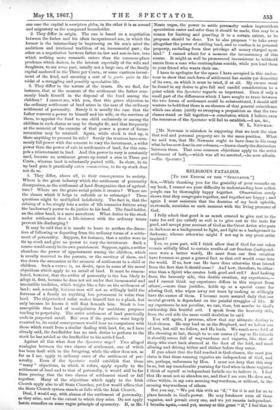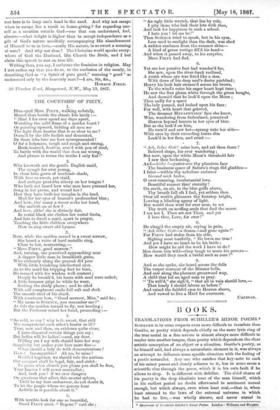RELIGIOUS FATALISM.
[To THE EDITOR OF THE "SPECTATOR."] Sin,—While thanking you for the geniality of your remarks on my book, I cannot see your difficulty in understanding how selfish people can be thoroughly happy together. Observation surely shows that they congregate together, and together are happy ; and again I must maintain that the doctrine of my book upholds, surrounds, nourishes us each moment with the living presence of God.
I fully admit that good is as much created to give zest to the taste for evil (so called) as evil is to give zest to the taste for good, and accept your account of God as the Great Artist who puts in darkness as a background to light, and light as a background to darkness ; whence otherwise might I not say is any great artist inspired?
You, on your part, will I think allow that if God for our sakes remain wilfully blind to certain results of our freedom (independ- ence were a better word), He must from our first creation have foreseen so great a general fact as that evil would come into the world. If so, how can He have done otherwise than intend from the first that it should come? And how, therefore, be other-
wise than a Spirit who creates both good and evil ? And looking from the heavenly side, this double creation, my experience,—
and I cannot think my experience differs in this respect from others',—more than justifies, holds up as a special cause for adoring God, who wipes away our tears by making us willingly have the causes of them. I become more assured daily that our mental growth is dependent on the painful struggles of life. If my experience be not peculiar, we can, then, but ascribe to God's authorship this fruitful evil. I speak from the heavenly side, from the evil side the same could doubtless be said.
You will again, I presume, allow that our ultimate destiny is God-chosen. He may lead us as the Shepherd, and we follow out of love, but still we follow, and He leads. We reach some fold of His choosing at last, though to us our course (I say as Ile intends it should) seems full of waywardness and vagaries, like that of sheep who start back alarmed at the door of the fold, and need alluring and driving hither and thither before they enter.
If you admit that the fold reached is God-chosen, the most you claim is that these seeming vagaries are independent of God, and are, perhaps, unforeseen by Him. I must not deny that this may be so, but my unendurable yearning for God when in these vagaries I think of myself as independent forbids me to believe it. I feel that He must not so abandon me, and that I am sure He does not, either within, in my own seeming waywardness, or without, in the seeming waywardness of others.
But you say, " We put this with an 6 if,' " for it is not for us to place bounds to God's power. He may foreknow even all these vagaries, and permit every one, and we yet remain independent. I breathe again,—and yet, uneasy at this great " if," I feel that to
rest here is to bury one's head in the sand. And why not escape when in escape lies a result so home-giving ? for regarding one- self as a creation outside God—one that can understand, feel, observe—what delight is higher than to accept independence as a gift of God's nature needfully accompanying His abandonment of Himself to us in love,—really His nature, in so sweet a seeming of ours? And why not thus ? The Christian world speaks every- where of God the Husband, His Church the Bride, and I but claim this speech to rest on true life.
Writing thus, you say, I enthrone the feminine in religion. May
I not rather say that you do so, to the exclusion of the manly, in describing God as " a Spirit of pure good," meaning " good " as understood only by the heavenly man ?—I am, Sir, &c.,
HORACE FIELD.
30 Patriot° Road, Hampstead, N.W., May 13, 1867.































 Previous page
Previous page